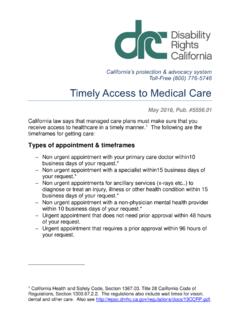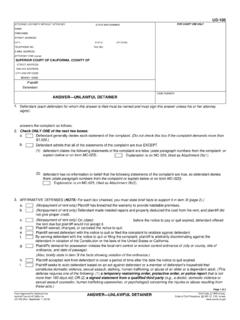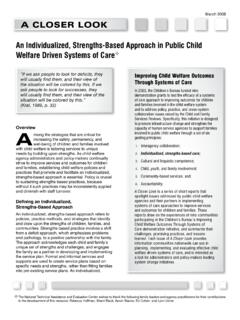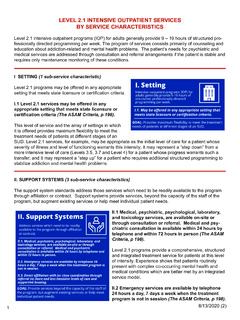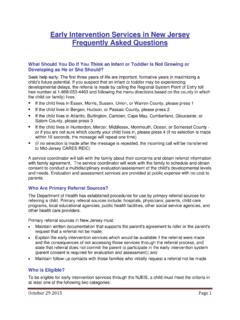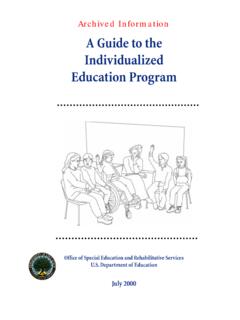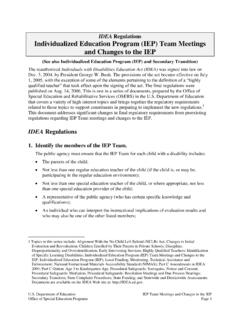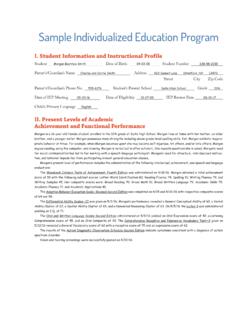Transcription of Individualized Program Plan (IPP) Planning Guide
1 California s protection & advocacy system Toll-Free (800) 776-5746 Individualized Program plan (IPP) Planning Guide April 2016, Pub. # A Booklet for People Who Use services From Regional Centers Capitol People First and Disability Rights California Peer Advocacy Project 1994 Revised 1998, 2003, 2010, 2016 Page 2 of 15 The Lanterman Act In California, people with developmental disabilities have the right to services that help them be a part of their communities and the law says people who use Regional Centers have the right to make decisions about the services and supports they need, including but not limited to: - Where to live - Who to live with - Where to work or go to school - Who to have for friends - What to do for fun - What to do in the future - What services and supports you want and need Also see the Rights Under the Lanterman Act publication at Who Can Receive services Under the Lanterman Act?
2 There are three groups of people who can get services under the Lanterman Act: 1. People who meet the Lanterman Act s definition of developmental disability in the Lanterman Act, including people with a substantial disability because of their cerebral palsy, epilepsy, autism, intellectual disability, and other conditions closely related to intellectual disability or that require similar treatment. 2. People who are at high risk of having a child with a developmental disability. 3. Babies and children under age 3 who are at high risk of becoming developmentally disabled. What is an Individual Program plan (IPP)? An IPP is an action plan that talks about the assistance you need to live the way you want. Page 3 of 15 An IPP identifies your goals, services , and supports so you can be more independent and participate in the community. An IPP is a written agreement and contract between you and the Regional Center.
3 It is written in a way you can understand. Timeline for an IPP The law says people must have an IPP meeting at least once every 3 years. Some people have an IPP done each year. You can ask for an IPP meeting at any time. Call your Regional Center service coordinator to schedule the IPP meeting. After you ask for an IPP meeting, it must happen within 30 days. If a final decision cannot be reached on any issue(s), you can schedule another meeting within 15 days or file an appeal. If the regional center says NO to any new service request, the laws say that you must get a written notice of the denial within 5 days in your preferred language. If the Regional Center says it wants to change or end a service you are already getting, and you disagree, it must give you a written notice in your preferred language 30 days before the change or cut-off. The notice must include an appeal form that you can fill out if you choose to appeal.
4 Why Your IPP Meeting is Important Your IPP meeting is the only time your IPP can be officially talked about and written up. If your Regional Center calls you about changing your services , tell them you want to talk about it at an IPP meeting. Your Rights at an IPP Meeting - You have a right to a written IPP that lists your future goals and what services you want and need. Page 4 of 15 - You have a right to services that are a part of your community - not only in places or groups for people with disabilities. - You have the right to help put together your IPP. - You have the right to disagree with any change in services on your IPP, even if a meeting has not been held with you. - You have the right to an interpreter or a facilitator (a helper) if you need one and the Regional Center has to get one for you. - You have the right to be at your IPP meeting and tell people what services you need and want.
5 - You have the right to have your IPP meeting in a place you want that is comfortable for you. The Regional Center cannot change your services or write your IPP without you attending the meeting. - You have the right to be provided with documents such as IPPs, Assessment Plans, IPP Rights, Appeal Rights, and Notices of Action in your native language. - You have the right to get services and supports in the least restrictive environment. The Regional Center and agencies that provide services to you, like group homes or programs , must allow you to make your own decisions. They must give you important information that you need to make decisions in a way that you can understand. Who is Part of the IPP Team? - You are the most important member. - Parents and Legal Guardians. - People who know you and care about you. - Your service coordinator from the Regional Center who can get you the services you want and need.
6 - A Multidisciplinary Team, when appropriate. - Anyone else you want there Page 5 of 15 What to do Before the IPP Meeting - Think about your goals for the future. Think about what you need to be healthy and safe in the community. Is there something new you would like to do? - Review your old IPP to see what is working or not working. Ask a friend or family member to help. Is there something you would like to do differently? - List your concerns and your goals. - List the services and supports that you think would help you meet your goals. - Talk to people you trust about what you want to say at your meeting. Then write it down or ask a friend or family member to assist you. - Record what you want to say with a recorder and bring it to your meeting. - Practice speaking up. You are your own best advocate about what you want and need. - It s a very important meeting.
7 Be prepared. Don t miss it. The IPP Meeting Planner at the end of this booklet can help you plan for your meeting. Also see 16 Tips for Getting Quality Regional Center services for Yourself or Your Child at What to Do At Your IPP Meeting - Talk with your team about what you want and need. - Share what you wrote (or recorded) about the plans and services you want. - Be polite and assertive. - You can ask to have a different service coordinator and you can ask to change the services that you get, if you need to. - There must be a person at your meeting who can say Yes or No to what is in your IPP. This can be your service coordinator or other Regional Center staff. Page 6 of 15 - Ask if there are any new assessments, reports, or observations. - Ask to talk about your strengths, interests, areas of growth, areas of need, and friendships. - Ask any other questions you have about your progress or services .
8 - Share your present and future goals. - Discuss any specific concerns you have. - Share any home conditions that may impact your performance or behavior at school or work and any recent documents or medical updates. - Take notes on recommendations and timelines, such as additional services or assessments. - Say out loud what you understand about the decisions made, actions to be taken, timelines, and roles and responsibilities of each person at the meeting. - Give feedback to the people working with you in areas where you noted positive effort, growth, or change. If the person who can approve services in your IPP is not at your meeting, the Regional Center must set up another IPP meeting within 15 days. The Regional Center staff member who approves services must attend. Right to services and Supports in Your IPP The Lanterman Act says your services and supports should help you be independent, a productive member of your community, and live in places where you are safe and healthy.
9 Here are some (but not all) of the services and supports the Regional Center can help you find and get. - Assistance getting into school or a training Program . - Adaptive Equipment: If you need things that can support you to become more independent like wheelchairs or computers that speak. See Funding Assistive Technology through the Regional Center at - Advocacy Training: If you need to learn more about your rights to speak up for yourself. Page 7 of 15 See DDS Consumer Advisory Committee publications at - Transportation services and/or training to learn how to use buses and other transportation on your own. - Crisis services : If you need a plan in case you have an emergency. - Parent Training: If you have children and you need to learn more about taking care of them. - Sexuality: If you have questions about sex or need help with your relationships. - Assistance with getting a job, including Supported Employment and putting together a small business.
10 - Living services : Assistance with selecting and moving into a home, selecting roommates or housemates, household furnishings, common daily living activities and emergencies, becoming a participating member in community life and managing personal financial affairs, so you can be more independent. - A facilitator to assist you, if you want to be on a committee or a member of a Board of Directors. See booklet about Facilitation from the DDS Consumer Advisory Committee at - Assistance to get involved in fun things happening in your community. See Using Your IPP to plan for Community Activities - Other services you need to live a better life. This can be different for each person. See a larger list at Remember! It s OK to ask for things you need that aren t on this list. Write the services and supports you need in your IPP with the help of your IPP team. Page 8 of 15 For more details on how to get services through your IPP, including sample letters and planners, see The Self-Determination Program Another way to receive services paid for by the Regional Center is the Self-Determination Program .



